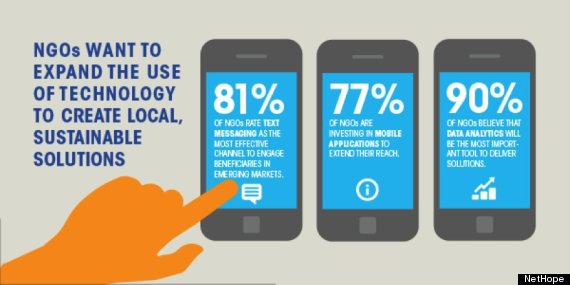It seems as if the days of manually doing routine tasks such as shopping and health care are slowly fizzling into obsolescence. People in both developed and developing countries are reshaping their daily lives and interactions as digital technology becomes intertwined with their everyday activities.
Interested in this trend, Accenture and NetHope partnered to explore this idea further by asking 300 decision-makers and nonprofit leaders in 13 markets one question: How is technology changing the way organizations engage and interact with people in emerging markets?
Our research revealed that while corporations can provide the tools needed for development, tools alone won't create lasting communities. For example, mobile technology frequently dominates success stories, but we found that simpler text-based applications for feature phones can be more effective than full-blown applications designed for smart phones. In the latter case, complex apps aren't practical for rural workers who don't own smart phones -- not to mention those who can't read. More than 70 percent of the business leaders we interviewed stressed the importance of tailoring technology to meet the needs of consumers in emerging markets, citing the fact that developed-world solutions are often ineffective. To effect true change, communities must be able to use new platforms to create new opportunities.
In addition to solving larger issues related to health and safety, technology is also creating new opportunities in emerging economies. Big data and analytics are changing the game for governments, businesses and NGOs who are trying to understand and serve local communities. Almost all of the nonprofits we interviewed said that data analytics will continue to be instrumental in analyzing the success of their programs.
For instance, the Grameen Foundation helps subsistence farmers in emerging economies by hiring local community knowledge workers to travel to rural areas and offer mobile phone-based information about crop prices, weather conditions and health issues. Using data gathered on their mobile phones, Grameen is able to determine what makes for a good community knowledge worker and whether certain interventions, such as providing bicycle transport, aid in reaching more people. In the end, a costly program was halted after a community knowledge worker gathered data that proved it to be ineffective.
Technology is also creating employment in the energy, consumer goods, engineering and health care. Industries. As businesses in these sectors develop and grow, there is an increasing demand for technology-related skills. One example is Oasis, a website created by a Kenyan company to provide small businesses with access to information that will help them grow, including sources and prices of raw materials, where and how to get business credit, and the best markets for small and medium enterprises.
Ultimately, our ability to create strong development outcomes is tied to the ability of programs to scale quickly and replicate success once it is validated by smaller trials. This quick approach will create new opportunities for program beneficiaries.
Technology is changing the way organizations engage and interact by providing people in emerging markets with tools to solve their own problems and request specific solutions that will fit their unique needs. This fundamental shift is a change from the traditional model.
Now, people in developing nations can define a new norm of interaction, leading to new possibilities and outcomes. It's no longer good enough to arrive in developing countries and proclaim to have all the answers. We need to refine our solutions by researching local markets, learning lessons from trial and error and welcoming feedback and possibilities from those on the ground.
Cisco Systems has supported NetHope since its inception in 2001 with equipment, employee time, and expertise. For more information click here.
